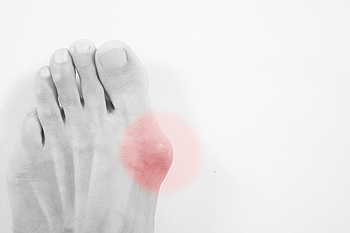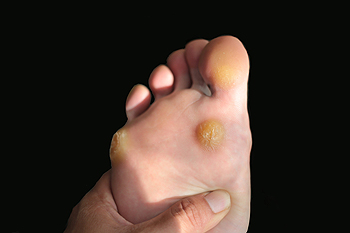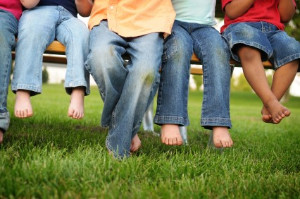Items filtered by date: February 2020
Possible Causes of Poor Circulation
 Poor circulation can stem from a variety of factors. Many patients' quality of life is often affected, and it may become difficult to perform daily activities. Common symptoms of this condition can include cold feet, a numbing and tingling sensation, and the feet and ankles may become swollen. Research has indicated that the most common cause of poor circulation is a condition that is known as atherosclerosis. It is defined as an excessive amount of plaque that builds up in the arteries and blood vessels. Additionally, diabetic patients may experience poor circulation, and this may affect one’s heart rate and blood pressure. If you have symptoms of this ailment, it is strongly advised that you consult with a podiatrist who can diagnose and help you to manage this condition.
Poor circulation can stem from a variety of factors. Many patients' quality of life is often affected, and it may become difficult to perform daily activities. Common symptoms of this condition can include cold feet, a numbing and tingling sensation, and the feet and ankles may become swollen. Research has indicated that the most common cause of poor circulation is a condition that is known as atherosclerosis. It is defined as an excessive amount of plaque that builds up in the arteries and blood vessels. Additionally, diabetic patients may experience poor circulation, and this may affect one’s heart rate and blood pressure. If you have symptoms of this ailment, it is strongly advised that you consult with a podiatrist who can diagnose and help you to manage this condition.
While poor circulation itself isn’t a condition; it is a symptom of another underlying health condition you may have. If you have any concerns with poor circulation in your feet contact Dr. Ronald Sheppard of Warren-Watchung Podiatry Center. Our doctor will treat your foot and ankle needs.
Poor Circulation in the Feet
Peripheral artery disease (PAD) can potentially lead to poor circulation in the lower extremities. PAD is a condition that causes the blood vessels and arteries to narrow. In a linked condition called atherosclerosis, the arteries stiffen up due to a buildup of plaque in the arteries and blood vessels. These two conditions can cause a decrease in the amount of blood that flows to your extremities, therefore resulting in pain.
Symptoms
Some of the most common symptoms of poor circulation are:
- Numbness
- Tingling
- Throbbing or stinging pain in limbs
- Pain
- Muscle Cramps
Treatment for poor circulation often depends on the underlying condition that causes it. Methods for treatment may include insulin for diabetes, special exercise programs, surgery for varicose veins, or compression socks for swollen legs.
As always, see a podiatrist as he or she will assist in finding a regimen that suits you. A podiatrist can also prescribe you any needed medication.
If you have any questions, please feel free to contact one of our offices located in Marlboro and Watchung, NJ . We offer the newest diagnostic and treatment technologies for all your foot care needs.
Treating a Bunion May Require Surgery
 Bunions can be identified as a bony protrusion on the side of the big toe. This condition may develop for a number of reasons. Common causes may include wearing narrow or ill-fitting footwear, having an existing foot condition such as flat feet or low arches, the occurrence of a foot injury, inflammatory arthritis, or even genetic factors. Neuromuscular conditions, such as cerebral palsy may also influence the formation of a bunion. Symptoms that are often associated with a bunion can include redness, soreness, or a burning sensation linked to the affected area. It can also be common for hammertoes to form, as well as calluses, when bunions are present. To relieve the pain that is associated with bunions, it is suggested to wear shoe inserts to lessen the friction, as well as investing in proper footwear that leaves your toes adequate room to move freely in. For some cases, the symptoms of bunions may be severe, in which case, surgery can be the recommended option for treatment. In order to best determine how to care for your bunion, consult with a podiatrist as soon as possible for professional care.
Bunions can be identified as a bony protrusion on the side of the big toe. This condition may develop for a number of reasons. Common causes may include wearing narrow or ill-fitting footwear, having an existing foot condition such as flat feet or low arches, the occurrence of a foot injury, inflammatory arthritis, or even genetic factors. Neuromuscular conditions, such as cerebral palsy may also influence the formation of a bunion. Symptoms that are often associated with a bunion can include redness, soreness, or a burning sensation linked to the affected area. It can also be common for hammertoes to form, as well as calluses, when bunions are present. To relieve the pain that is associated with bunions, it is suggested to wear shoe inserts to lessen the friction, as well as investing in proper footwear that leaves your toes adequate room to move freely in. For some cases, the symptoms of bunions may be severe, in which case, surgery can be the recommended option for treatment. In order to best determine how to care for your bunion, consult with a podiatrist as soon as possible for professional care.
If you are suffering from bunion pain, contact Dr. Ronald Sheppard of Warren-Watchung Podiatry Center. Our doctor can provide the care you need to keep you pain-free and on your feet.
What Is a Bunion?
Bunions are painful bony bumps that usually develop on the inside of the foot at the joint of the big toe. As the deformity increases over time, it may become painful to walk and wear shoes. Women are more likely to exacerbate existing bunions since they often wear tight, narrow shoes that shift their toes together. Bunion pain can be relieved by wearing wider shoes with enough room for the toes.
Causes
- Genetics – some people inherit feet that are more prone to bunion development
- Inflammatory Conditions - rheumatoid arthritis and polio may cause bunion development
Symptoms
- Redness and inflammation
- Pain and tenderness
- Callus or corns on the bump
- Restricted motion in the big toe
In order to diagnose your bunion, your podiatrist may ask about your medical history, symptoms, and general health. Your doctor might also order an x-ray to take a closer look at your feet. Nonsurgical treatment options include orthotics, padding, icing, changes in footwear, and medication. If nonsurgical treatments don’t alleviate your bunion pain, surgery may be necessary.
If you have any questions, please feel free to contact one of our offices located in Marlboro and Watchung, NJ . We offer the newest diagnostic and treatment technologies for all your foot care needs.
Alleviate the Pain of Your Corns
 Corns, typically found on the toes, side, and bottom of the feet, can be incredibly uncomfortable and often painful. Simple everyday activities, such as walking, can become difficult if corns are left untreated. Corns are hardened layers of the skin, often caused by too much friction and the use of improper footwear. They can feel very sensitive when touched, and often become irritated when shoes are worn. To help lessen the pain of a corn, it’s advised that you wear a cushion or pad over your corn to stop any further friction. It is also suggested to soak the feet in warm water, and filing at the corn may help to decrease its size. In order to safely treat your corn, it is recommended to consult with a podiatrist for professional care.
Corns, typically found on the toes, side, and bottom of the feet, can be incredibly uncomfortable and often painful. Simple everyday activities, such as walking, can become difficult if corns are left untreated. Corns are hardened layers of the skin, often caused by too much friction and the use of improper footwear. They can feel very sensitive when touched, and often become irritated when shoes are worn. To help lessen the pain of a corn, it’s advised that you wear a cushion or pad over your corn to stop any further friction. It is also suggested to soak the feet in warm water, and filing at the corn may help to decrease its size. In order to safely treat your corn, it is recommended to consult with a podiatrist for professional care.
Corns can make walking very painful and should be treated immediately. If you have questions regarding your feet and ankles, contact Dr. Ronald Sheppard of Warren-Watchung Podiatry Center. Our doctor will treat your foot and ankle needs.
Corns: What Are They? And How Do You Get Rid of Them?
Corns are thickened areas on the skin that can become painful. They are caused by excessive pressure and friction on the skin. Corns press into the deeper layers of the skin and are usually round in shape.
Ways to Prevent Corns
There are many ways to get rid of painful corns such as:
- Wearing properly fitting shoes that have been measured by a professional
- Wearing shoes that are not sharply pointed or have high heels
- Wearing only shoes that offer support
Treating Corns
Although most corns slowly disappear when the friction or pressure stops, this isn’t always the case. Consult with your podiatrist to determine the best treatment option for your case of corns.
If you have any questions please feel free to contact one of our offices located in Marlboro and Watchung, NJ . We offer the newest diagnostic and treatment technologies for all your foot and ankle needs.
Children And Wearing Shoes
Children are born with flexible feet. The bones, muscles, ligaments, and tendons will become stronger as walking and running occur. Research has indicated it is unnecessary for children to wear shoes while indoors. This enables the feet to become stronger as a result of the toes grasping the floor. As walking begins, the arch gradually increases in strength, and will fully develop during the late teenage years. When children begin walking outside, it is important to properly measure your child’s feet, as this can help you to determine what size shoe to purchase. The shoes need to be flexible, in addition to providing adequate stability. Children’s shoes last an average of four months, which can depend on the activity level. If you would like additional information about how to fit your child for shoes, please schedule a consultation with a podiatrist.
Making sure that your children maintain good foot health is very important as they grow. If you have any questions, contact Dr. Ronald Sheppard of Warren-Watchung Podiatry Center. Our doctor can provide the care you need to keep you pain-free and on your feet.
Keeping Children's Feet Healthy
Having healthy feet during childhood can help prevent medical problems later in life, namely in the back and legs. As children grow, their feet require different types of care. Here are some things to consider...
Although babies do not walk yet, it is still very important to take care of their feet.
Avoid putting tight shoes or socks on his or her feet.
Allow the baby to stretch and kick his or her feet to feel comfortable.
As a toddler, kids are now on the move and begin to develop differently. At this age, toddlers are getting a feel for walking, so don’t be alarmed if your toddler is unsteady or ‘walks funny’.
As your child gets older, it is important to teach them how to take care of their feet.
Show them proper hygiene to prevent infections such as fungus.
Be watchful for any pain or injury.
Have all injuries checked by a doctor as soon as possible.
Comfortable, protective shoes should always be worn, especially at play.
If you have any questions please feel free to contact one of our offices located in Marlboro and Watchung, NJ . We offer the newest diagnostic and treatment technologies for all your foot and ankle needs.


